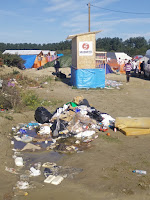Goth Noor Muhammad is just 25 kilometres from Karachi but apart from the
Karachi Metropolitan Corporation (KMC) drivers no one else is aware of
how the people of this village survive. The entire village is dependent upon
Karachi’s garbage.
The village lacked all basic facilities such as health, education and
potable water five years back. Despite living here for over 30 years, the
residents have only recently been given access to the most basic of facilities,
such as shelter, a school, health facilities, a water plant and clean streets.
The Pakistan Poverty Alleviation Fund (PPAF), in collaboration with Shell
Pakistan and the Health and Nutrition Development Society (HANDS), on Tuesday
celebrated five years of integrated development initiatives in this settlement
where the KMC dumps around 25 per cent of the city’s trash. This garbage is
village’s only source of survival.
Accepting the government’s lack of interest in developing such
settlements, federal state minister Abdul Hakeem Baloch said that the
public-private partnership has changed people’s standard of living. “The people
living in posh areas aren’t aware of the sense of deprivation that prevails in
these villages,” he explained.
“Nothing has been given to these people for last 65 years,” Baloch said.
“Let the world see how people live here. What they eat and how they earn.”
PPAF CEO Qazi Azmat Isa still hopes for the best. “Pakistan is going
through some very challenging times but hope continues to exist. It is only
when people from different walks of life come together for the common good that
magic happens.” While visiting the new facilities provided to the
villagers, HANDS chief executive Dr Shaikh Tanveer Ahmed said this is first
time in their life that these people will enjoy basic facilities.
In 2010, the PPAF and its implementing partner, HANDS, along with Shell,
Pakistan began working in Goth Noor Muhammad to help residents change their
lives for the better. As many as 133 housing and 34 sanitation units were
constructed. The village divided into 51 clusters of two to three housing
units, with each cluster having a common kitchen, toilet and a water storage
tank.
Electricity and clean drinking water remained a major problem for the
residents so the PPAF has recently installed solar-powered lights in each
housing compound, while Shell installed a reverse-osmosis plant in the
settlement to provide drinking water.
Over the past five years, PPAF has spent Rs27 million on housing,
infrastructure, solar-powered lighting, health and education facilities, while
Shell Pakistan has contributed an additional Rs14.3 million for housing and the
provision of drinking water.
“It is a good work you have done. It is my first visit to Karachi and I
am here with you,” said Jeannette Seppen, ambassador of the Kingdom of
Netherlands, to the women of the village. “The first task was to motivate the
community. Converting this settlement into a model village wasn’t an easy task.
The infrastructure will change the living standard of these marginalised people
living in Karachi’s rural area,” said the general manager of HANDS, Nadeem
Wagan.
Source: http://tribune.com.pk/story/965306/the-transformation-of-a-village/
 I understood why many of the volunteers, like Martin McTigue, a senior manager with the London Ambulance Service who had driven us to ‘the Jungle’, were wearing wellies. But I noticed some of the refugees wearing trainers, crocs or flip flops.
I understood why many of the volunteers, like Martin McTigue, a senior manager with the London Ambulance Service who had driven us to ‘the Jungle’, were wearing wellies. But I noticed some of the refugees wearing trainers, crocs or flip flops.
 I understood why many of the volunteers, like Martin McTigue, a senior manager with the London Ambulance Service who had driven us to ‘the Jungle’, were wearing wellies. But I noticed some of the refugees wearing trainers, crocs or flip flops.
I understood why many of the volunteers, like Martin McTigue, a senior manager with the London Ambulance Service who had driven us to ‘the Jungle’, were wearing wellies. But I noticed some of the refugees wearing trainers, crocs or flip flops.








